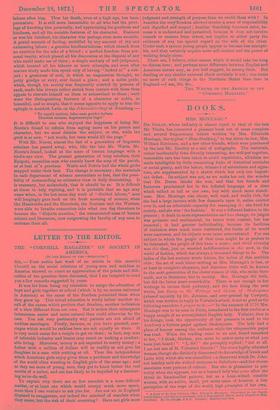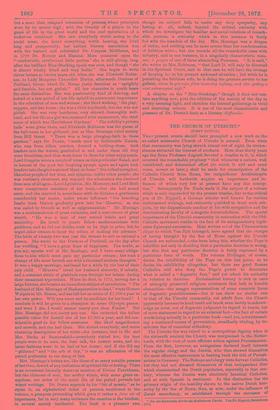BOOKS.
MRS. MONTAGU.*
DR. DORAN, whose industry is almost equal to that of the late Mr. Timbs, has concocted a pleasant book out of some complete and several fragmentary letters written by Mrs. Elizabeth Montagu, the typical " Blue-Stocking," to her sister-in-law, Mrs. William Robinson, and a few other friends, which were purchased by the late Mr. Bentley at a sale of autographs. The materials, rather incidentally than directly interesting, are well put together, reasonable care has been taken to avoid repetitions, allusions are made intelligible by little connecting links of historical reminder or social gossip, and the lettere, trimmed of salutations and signa- ture, are supplemented by a sketch which has only one import- ant defect. Its subject was not, as we make her out, the wonder that Dr. Doran thinks she was, and that her friends and flatterers proclaimed her in the inflated language of a time which talked as tall as our own, but with much more stateli- ness. Mrs. Montagu was clever, well read, and really rich, for she had a large income with few demands upon it, entire control over it, and an admirable capacity for managing it ; she lived for society, and she was the fashion.' It was a different fashion to the present ; it dealt in more representation and less change, its jargon was pedantic and sentimental, its tastes were coarser, but leas immoral ; it had greater individuality, because its facilities of imitation were much more restricted, the limits of its world were narrower, and its objects were more concentrated. For one subject in which the people of that time might be or profess to be interested, the people of this have a score ; and vivid vivacity was chic then, just as wearied indifferentism is chic now, in the world of fashion, which has always a thousand things to do. The ladies of the last century wrote letters, the ladies of this scribble chits ; the art of such letter-writing as Mrs. Montagu's is lost, or at least in complete abeyance, and therefore little will be known to the next generation of the clever women of this, who make their mark, not in literature, but in society. Mrs. Montagu did both, but did the latter more remarkably. There is not enough in her writings to excuse their pedantry, and the best thing she ever wrote, her Essay on the Writings and Genius of Shakespeare (abused unjustly by Dr. Johnson, and over-praised by Cowper), which was written in reply to Voltaire's attack, is not so good as the following anecdote apropos to it :—" In the summer of 1776 Mrs. Montagu was to be seen in Paris, introduced to the first circles as a
happy sample of an accomplished English lady. Voltaire, then in his dotage, took the opportunity of her presence to send to the Academy a furious paper against Shakespeare. The lady had a
place of honour among the audience while the vituperative paper was read. When the reading came to an end, Suard remarked
to her, " I think, Madam, you must be rather sorry at what you have just beard ! " " I, Sir !" she promptly replied ; " not at all. I am not one of M. Voltaire's friends !" She was a highly educated woman, though she distinctly disavowed the knowledge of Greek and Latin with which she was accredited—a disavowal which Dr. John- son harshly said she wished everyone to disbelieve—and her chosen
associates were persons of culture. But she is pleasanter to pos- terity when she appears, not as a learned lady who poses after the Hotel de Rambouillet pattern, but as a keen-witted, sensible woman, with an active, staid, yet acute sense of humour, a fine perception of the ways of the world, high principles of her own, • A Lady of the Last Century (Mrs. Elisabeth Montagu): Illustrated in her Unpub- lished Letters, collected and arranged, with a Biographical Sketch, and a Chapter on Blue- Stockings. By Dr. Doren, F.S.A. London: Bentley and Son. but a more than resigned toleration of persons.whose principles were by no means high ; with the vivacity of a player in the game of life in the great world and the cool speculation of a looker-on combined. She saw everybody worth seeing in the social sense, she heard everything worth hearing, she lived long and prosperously, her earliest literary association was with the learned and celebrated Dr. Conyers Middleton, and in 1798 Dr. Burney and Hannah More comment upon the " comfortable, intellectual little parties" she is still giving, long after the brilliant Blue-Stocking epoch was over, and though " she is almost wholly blind and very feeble." She began to write clever letters at twelve years old, when she was Elizabeth Robin- son, to Lady Margaret Cavendish Harley, afterwards Duchess of Portland, letters which Dr. Doran justly describes as " sprightly and forcible, but not girlish." All her character in youth bears the same distinction. She was passionately fond of dancing, and indeed at a late period of her life upheld its paramount importance in the education of men and women ; she liked walking, the play,' suppers, and late hours ; she was a little hoydenish, but she was not girlish. She was very handsome, very shrewd, thoroughly well- bred, and her life as a girl was crammed with amusement, the chief scene of which was Marylebone Gardens I The nobility's private balls' were given there, and Elizabeth Robinson was the queen of the ball-room in her girlhood, just as Mrs. Montagu ruled society from Hill Street. " There was a large plunging-bath in those gardens," says Dr. Doran, "much used by fashionable Naiads, who rose from silken coaches, donned a bathing-dress, took headers into the waters, gambolled in and under them till they were breathless, and then went home to dress for other enjoyments. Lord Dupplin wrote a couple of verses on this particular Naiad, and in honour of the poet the laughing nymph again and again took headers into the glad waters of Mary-le-bone." She talked metaphor, like other people of her time, and epigram, unlike other people; she was restlessly observant, she enjoyed the admiration she received from men of all ages—Lord Lyttelton, Mr. Mounsey, and Lord Bath were conspicuous members of her train,—but she had sound sense, and she married in accordance with its dictates a gentleman considerably her senior, under whose influence "the bounding Lambe from Horton gradually grew into the Minerva,' as she was called by friends as well as epigrammatists." Mr. Montagu was a mathematician of great eminence, and a coal-owner of great wealth. "He was a man of very retired habits and great amiability. He loved to puzzle fellow - mathematicians with problems, and he did not dislike coals to be high in price, but he urged other owners to incur the odium of making the advance." The bride of twenty-two was just the woman to suit so rational a person. She wrote to the Duchess of Portland, on the day after her wedding, "I have a great hope of happiness. The world, as you say, speaks well of Mr. Montagu, and I have many obliga- tions to him which must gain my particular esteem ; but such a change of life must furnish one with a thousand anxious thoughts." It was a happy marriage, saddened for a while by the loss of their only child. " Minerva " loved her husband sincerely, if soberly, and a constant strain of gratitude runs through her letters during their occasional separations. When he died, in 1775, leaving her a large fortune, she became an immediate subject of speculation. " The husband of Mrs. Montagu of Shakespearshire is dead," wrote Horace Walpole to Mr. Mason, and has left her an estate of £7,000 a year in her own power. Will you come and be candidate for her hand? I conclude it will be given to a champion at some Olympic games ; and were I she, I would sooner marry you than Pinder." But Mrs. Montagu did not marry any one. She extracted the fullest possible value for herself out of her £7,000 a year, and did con- siderable good to her fellow-creatures. She liked magnificence and crowds, and she had them. She visited everybody, and wrote charming descriptions of her visits—for instance, that to Mr. and Mrs. Burke at Beaconsfield—everybody visited her, the best people were to be seen, the best talk, the newest news, and the latest fashions were to be bad at her house ; and if she did say " philomel " and "the orb of day," it was an affectation of the period preferable to the slang of this.
Mrs. Montagu's letters are, like those of so many notable persons of her time, devoid of any indication of spiritual life or feeling. There is an occasional formally decorous mention of Divine Providence, but the thinness of soul, the aridity which, with some great ex- ceptions, are notes of the social life of the period, pervade her wisest writings. Dr. Doran appends to his "bit of mosaic," as he styles it, an alphabetical index of persons mentioned in the volume, a pompous proceeding which gives it rather a faux air of importance, for in very many instances the mention is the briefest, in several merely incidental. The book is a pleasant one, though its subject fails to excite any deep sympathy, any- feeling at all, indeed, beyond the critical curiosity with which we investigate the familiar and social relations of remark- able persons, a curiosity which in this instance is freely fed with the scandals of the day. Mrs. Montagu was a dragon• of virtue, and nothing can be more severe than her condemnation of faithless wives ; but she records all the remarkable cases with industry, and in one instance, in a singularly characteristic man- ner, a propos of one of three absconding Peeresses. " It is said," she writes to Mrs. Robinson, " that Lord D. will only be divorced in the Spiritual Court, and in that case he will have the revenge of keeping her in her present awkward situation ; but while he is punishing the faithless wife, he is doing the greatest service to her gallant, whom he prevents from incurring infamy, and also getting a- most extravagant wife."
A chapter on the " Blue-Stockings," though it does not con- tain anything new, puts the oddities of the society of the day in a very amusing light, and sketches the learned gatherings in vivid and charming colours. It is one of the most characteristic and pleasant of Dr. Doran's feats as a literary chiffonier.



































 Previous page
Previous page